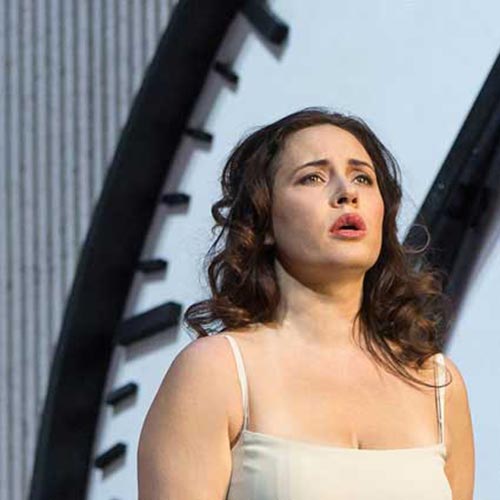|
SATURDEE OPRY LINKS 49:
Goodbye, Carol; Hello, Sonya
 
Carol Neblett
Sonya Yoncheva
Saturdee Opry Links Overture!
"Tosca," by Puccini. (Nice little orchestra.)
https://www.youtube.com/watch?v=XJnBjFCh5So
1.
Carol Neblett died in 2017 at 71. She had a spectacular career before
alcoholism cut it short when she was only in her '40's. Yet she rebounded for a
distinguished career as a voice teacher at Chapman College in Southern
California. Here she is with "Non Piu di Fiori," or "No More Flowers," from
Mozart's "La Clemenza di Tito."
https://www.youtube.com/watch?v=IpmdMIEYbyM
Synopsis:
Vitellia, daughter of the former Emperor Vitellius, is in love with Emperor
Titus. He loves another, so she induces Sextus, a friend of Emperor Titus who is
in love with her, to murder Titus. Sextus does not succeed and is imprisoned,
and she realizes that she must tell the emperor that she asked him to commit the
crime. Sextus is prepared to die for her if she does not. She realizes that she
must abandon her hopes for the throne and marriage to Titus by telling the
truth.
Translation:
http://www.aria-database.com/search.php?individualAria=1189
2.
Neblett debuted as a singer in the L.A. Master Chorale under Roger Wagner, in
1968. It was the same year when she attended a New York City Opera production in
L.A., and decided to become an operatic soprano. Only a year later, at 23, she
debuted with NYCO as Musetta in Puccini's "La Boheme." Here is the late soprano,
singing "Quando m'en vo," from that opera on "The Tonight Show, with Johnny
Carson."
Synopsis: At the Cafe Momus on Christmas Eve, Paris, Musetta sings of how men
love to stare at her (and how she doesn't really mind it), mostly to inspire
jealousy in her estranged lover, Marcello.
https://www.youtube.com/watch?v=U4X2jkav5KA
Translation:
http://www.aria-database.com/search.php?individualAria=34
A little more for Johnny (and Dave.)
https://www.youtube.com/watch?v=gJtGjRUSW-M
SPECIAL:
A life spent singing with the likes of Domingo and Pavarotti, appearing with the
country's greatest opera companies (84 appearances at the Met), and what do you
get in your obit headline? That you once "bared it all." Right, take off your
top in one little opera. . .Well, Carol Neblett did, in Massenet's "Thais," in
New Orleans in 1973, and never regretted it. As she once put it:
“I'm a love object and a love subject. Whatever I do on this earth comes from
needing to be loved and wanting to return it. I would definitely say I'm
sensual.”
https://www.washingtonpost.com/local/obituaries/carol-neblett-star-soprano-who-once-bared-all-for-opera-dies-at-71/2017/11/27/c23475e8-d384-11e7-a986-d0a9770d9a3e_story.html?utm_term=.0aab9406ba4c
http://www.nytimes.com/1974/03/31/archives/what-do-you-say-to-a-naked-prima-donna.html
3.
Goodbye, Carol Neblett. You lived for art, lived for love, like Tosca.
https://www.youtube.com/watch?v=ynKMyTzgGrM
Synopsis, translation:
http://www.aria-database.com/search.php?individualAria=302
4.
Here is Ms. Neblett at the height of her powers, with Placido Domingo, in the
love duet from Puccini's "Manon Lescaut," at the Met. Tremendous stuff.
https://www.youtube.com/watch?v=TytEDmdPdOw
Synopsis: Returning to meet Des Grieux, Manon says she has kept her word, but
maybe it would have been better if they had not met. Manon slips out of the inn
to meet des Grieux as promised (Manon: Vedete? Io son fedele alla parola mia –
You see? I am faithful to my word). He declares his love for her and advises her
of the plot to abduct her, while Edmondo arranges for the carriage Geronte has
hired to take the couple to Paris.
Translation: (do a search for "Vedete? Io son," and start there.)
http://www.murashev.com/opera/Manon_Lescaut_libretto_Italian_English
About the opera: https://en.wikipedia.org/wiki/Manon_Lescaut_
5.
We have Jascha Heifetz, apparently, to thank for the soprano of the late Carol
Neblett. Ms. Neblett said she began playing the violin at 2, taught by a
grandmother who had performed with the Los Angeles Philharmonic, and switched to
singing at the suggestion of Heifetz, who found her vocal skills more promising
than her talent at the fiddle. . .Here is Ms. Neblett's last vocal appearance on
stage, as far as I know. I was lucky to be there---at the L.A. revival of the
Broadway revival of Sondheim's "Follies," in 2012. (There will never be a better
cast assembled for this wonderful musical. Repeat, never.) She played aging
opera singer Heidi Schiller. "One more kiss before we part." Note: the
principals in the cast are shadowed by their youthful ghosts.
https://www.youtube.com/watch?v=VsgQGFw-gxo
5.
Sonya Yoncheva, who I thought was exceptionally good, in-the-moment realistic in
the Met's "Tosca," will sing "Mimi" in Puccini's "La Boheme" in a couple of
weeks (it will be telecast live in HD in theaters across the country, if you are
interested.) The part was her Met debut in 2014, when she was asked to sub at
the last minute. Here she is with "Mi Chiamano Mimi" at the Met's 50th
anniversary celebration in 2017. Note how she has a gift for appearing to
spontaneously invent the worlds she sings, as if she is thinking them for the
first time.
https://www.youtube.com/watch?v=K4_MiIQfNRs
Synopsis : After Rodolfo tells her that he has fallen in love with her, he asks
Mimi to tell him something of her. She responds, telling him (among other
things) that her name is Lucia, although she is called Mimi.
Translation:
http://www.aria-database.com/cgi-bin/aria-search.pl%3Fopera%3DLa%2BBoh%25C3%25A8me%26a
That spontaneous quality is even more on display at this La Scala performance of
the aria:
https://www.youtube.com/watch?v=CcQRUtqkQRk
SPOTLIGHT:
Here is a profile from 2014. Asked to sub as "Mimi" at the last minute, she
learned much of the part on the plane to New York (while nursing her baby.)
Really.
https://www.nytimes.com/2014/11/27/arts/the-soprano-sonya-yoncheva-is-poised-for-stardom.html
6.
Yoncheva trained mainly in the Baroque tradition, until she began to get
restless. “In Baroque music, people say, ‘OK, you are a Baroque singer, and you
should keep that for all your life,’” she said. “And I didn’t want that for me.
I wanted to open to another world.” That other world opened in 2010, when she
won Operalia, the world opera competition founded and conducted by Plácido
Domingo. “This is how I went into the serious stuff.”
Here she is with the baroque aria, "Lascia ch’io pianga," ("Let me weep") by
Handel (she has recorded an entire Handel album), which is also pretty serious
stuff.
https://www.youtube.com/watch?v=znqYKrz0Sk0
Setting: A garden in Argante's palace, Jerusalem, Palestine, during the Crusades
Synopsis: Almirena has been abducted by the sorceress Armida and imprisoned in
the palace. She laments her fate.
Translation:
https://www.thoughtco.com/lascia-chio-pianga-lyrics-and-text-translation-724052
7.
Okay, sopranos, want to expand your voice? Expand your girth---with a pregnancy.
Huh? So says Bulgarian soprano Sonya Yoncheva:
“They told me there would be some change in my voice and my body and everything.
I said, ‘Well, it can’t be so much. It will still be my voice.’ And it is still
my voice. But I can really feel that I get to another range of soprano,” she
says. “It opened into a completely wide range of color.”
https://www.youtube.com/watch?v=4vIuD06DlJI
Here she is in a preposterous staging of Verdi's "La Traviata" at the Met, early
last year. "Addio del Pasato." "Farewell to the past." Starts at the 2:00 mark.
Synopsis: Violetta is now poor and about to die. She receives a letter from
Alfredo's father saying that Alfredo has discovered why she lied about her love
for him and is coming to her. She knows that it is too late, though, and sings a
farewell to her happiness with Alfredo.
Translation:http://www.aria-database.com/search.php?individualAria=310
8.
Sonya Yoncheva sings the mysterious, alluring "Tacea la notte placida" ("the
night was still and quiet") from Verdi's "Il Trovatore." No, it won't make you
forget Leontyne Price, but it will make you remember Sonya Yoncheva. Listen for
the effortless purity of tone, the dark quality that is almost mezzo.
https://www.youtube.com/watch?v=oASXURJ0-DU
Setting: The gardens of the palace of Aliferia, Aragon, 1409.
Synopsis: Leonora reveals to her servant, Ines, that she heard someone
serenading her in the garden. However, when she goes out to see who the
troubadour is, she finds that it is, in fact, a knight in black armor who she
had once crowned as the champion of a tournament. She quickly fell in love with
him.
Translation:
http://www.aria-database.com/search.php?individualAria=506
9.
FINAL BOW: Sonya Yoncheva sings "Casta Diva," from Bellini's "Norma." It won't
make you forget Callas, but it might make you remember Yoncheva.
https://www.youtube.com/watch?v=g-6JhBYZCrw
Setting: Night in the Druid's sacred forest, Gaul, around 50 B.C.
Synopsis: The Druids have come to meet with Norma, their high priestess. They
want to revolt against their Roman oppressors but Norma convinces them that
their time to rise up has not come yet. The Romans will be defeated by their own
failings. Norma then invokes the moon and prays for peace. While the chorus of
Druids sings their derison for the Romans, Norma sings her cabaletta, privately
worrying that that the hatred for the Romans must also translate to hatred for
Pollione, her secret Roman lover.
Translation:
http://www.aria-database.com/search.php?individualAria=356
Saturdee Opry Links Encore!
Forgot tenors today. This will make up for it, perhaps.
https://www.youtube.com/watch?v=ERD4CbBDNI0
There is something even nicer than a sunny day. . .
Translation:
https://en.wikipedia.org/wiki/%E2%80%99O_sole_mio
Back to Opera Links
Back to Home Page
|



